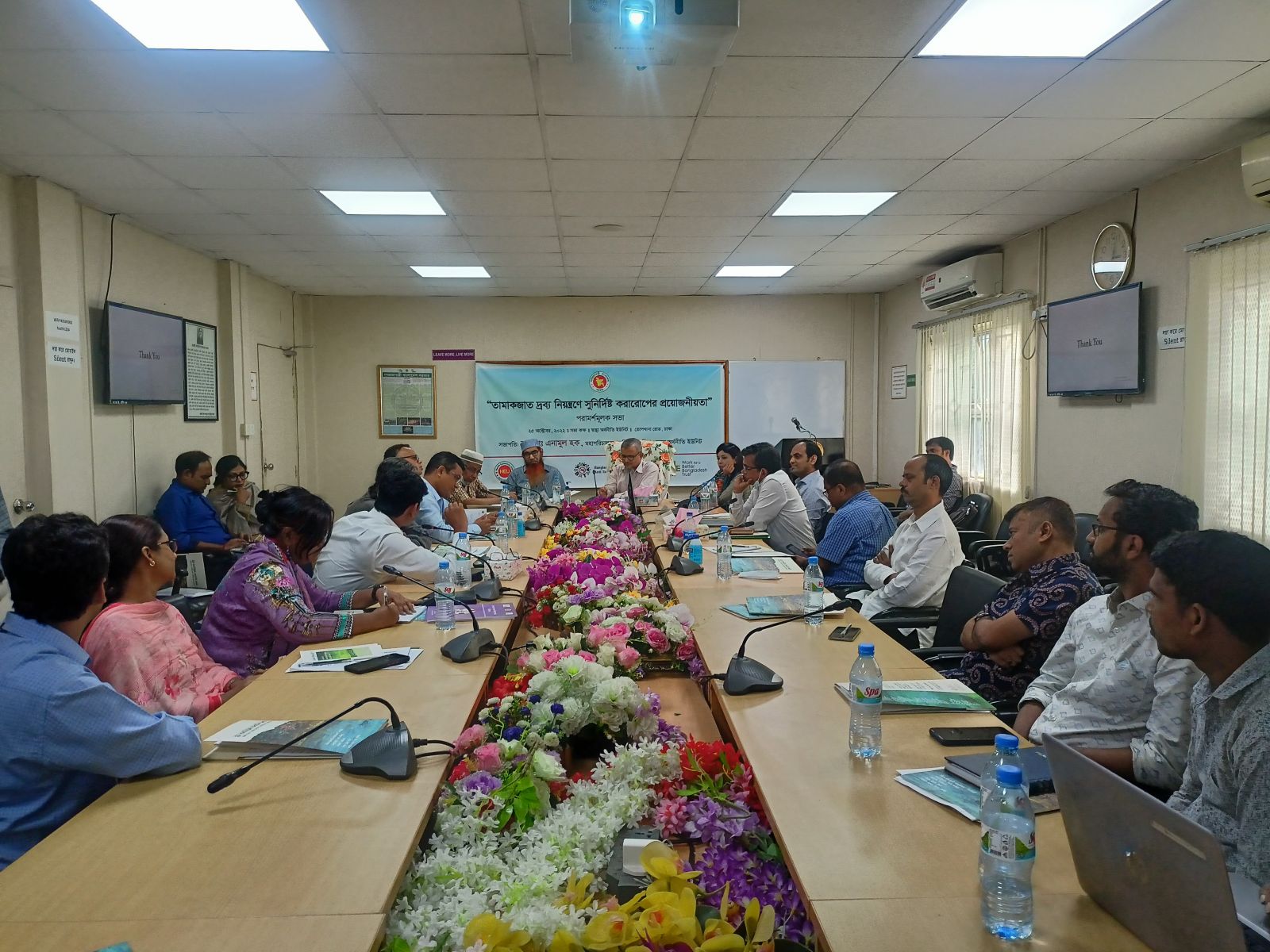
 Continuing to increase taxes on tobacco products is considered as one of the most effective means of controlling tobacco use. Besides, if it is possible to implement specific taxation provisions, the revenue of the government will increase and tax evasion will be prevented. It is important to keep the young generation away from the use of tobacco products in order to achieve the target of implementation of the commitment of the Hon'ble Prime Minister to make tobacco free Bangladesh by 2040. With emphasis on the above issues, a consultative meeting on "Need of imposing Specific Taxes to Control Tobacco Products" was organized by Health Economics Unit (HEU), Bangladesh Anti-Tobacco Alliance (BATA) and Work for a Better Bangladesh (WBB) Trust on 25th October, 2022 in the conference room of Health Economics Unit. The meeting called for reducing dependency on tobacco and finding other means of revenue generation. Besides, it was highlighted that all types of unhealthy products such as soft drinks, sweets, and all types of processed (SSB) food are being taxed and taken beyond the purchasing power of the consumer.
Continuing to increase taxes on tobacco products is considered as one of the most effective means of controlling tobacco use. Besides, if it is possible to implement specific taxation provisions, the revenue of the government will increase and tax evasion will be prevented. It is important to keep the young generation away from the use of tobacco products in order to achieve the target of implementation of the commitment of the Hon'ble Prime Minister to make tobacco free Bangladesh by 2040. With emphasis on the above issues, a consultative meeting on "Need of imposing Specific Taxes to Control Tobacco Products" was organized by Health Economics Unit (HEU), Bangladesh Anti-Tobacco Alliance (BATA) and Work for a Better Bangladesh (WBB) Trust on 25th October, 2022 in the conference room of Health Economics Unit. The meeting called for reducing dependency on tobacco and finding other means of revenue generation. Besides, it was highlighted that all types of unhealthy products such as soft drinks, sweets, and all types of processed (SSB) food are being taxed and taken beyond the purchasing power of the consumer.
Under the chairmanship and moderatorship of Md. Enamul Haque (DG, Additional Secretary, HEU) the keynote was presented by Md. Nazmul Hossain (Assistant Professor, Economics Department, Dhaka University). Syeda Nausheen Parnini (Director, Research, HEU) presented the welcome speech at the meeting. Hossain Ali Khondkar (Coordinator, Additional Secretary, NTCC), Dr. Nasiruddin Ahmed (Former Chairman, NBR), Kazi Rezaul Hasan (Second Secretary, NBR), Saifuddin Ahmed (Coordinator, BATA), Ad. Syed Mahbubul Alam (TA, The Union) and Sushant Sinha (Special Correspondent, 71 Television) were present as guest of honor and expert discussant in the open discussion session of the meeting. Besides, the representatives of Unnoyon Shomonnoy, Tobacco Control and Research Cell (TCRC), STOP, Development Activities of Society (DAS), Prottasha Anti-Drug Organization, NATAB, Shastho Shurokkha Foundation and others were present in the meeting.
Speakers said the specific taxation approach to tobacco control has achieved international success. But in the contemporary context, tobacco use is increasing among the people due to low prices and taxes, aggressive campaigns and interventions by companies. It's a great concern for overall public health. In the last 12 years, the purchasing power of the people of Bangladesh has increased several times and the prices of daily necessities have increased along with it. But because of the low base price, the sales price remains within the reach of the actual tobacco consumer even though the tax increases by a very small amount every year. Due to the failure of the existing tax system and tax collection system, there is a huge shortfall in the revenue of the government. It’s badly needed to ban the different price tiers and cheap cigarettes prevalent in the market. Therefore, it is very important to increase the tax and price of tobacco products in line with the increase in purchasing power. The base price of all types of tobacco products in Bangladesh is very low. As a result, even if the tax rate is high, there is no effect on the price increase. In the case of tobacco products, it will be possible to reduce the demand for the product if specific taxes are imposed taking into account the shortcomings of the ad valorem tax system. Moreover, it is also recognized internationally that specific taxes are relatively easy to calculate and have a visible impact on increasing the price of the product.
Each brand of tobacco product is sold at a price of Tk 10-25 higher than the retail price depending on the location, with the exception of the word "Maximum" being mentioned before the retail price on the packet. The government does not earn any revenue on this additional price. As a result, the government is losing revenue of about TK. 13.68 crore per day and about Tk. 5 thousand crore per year. The imposition of value added tax, supplementary duty, health promotion surcharge as well as specific taxes on tobacco product packets will significantly increase the price of tobacco products. The meeting discussed raising taxes on tobacco as well as other health hazardous products such as SSBs and setting up a health promotion foundation to strengthen the immune system. The Health Economics Unit could investigate the percentage reduction in consumption resulting from an increase in specific amount of taxes on tobacco products.
In addition, tobacco companies market multiple price range tobacco products at different price tyres. Besides, the government is losing huge amount of revenue due to frequent use of fake bandrolls and smuggling. In this case, it is possible to prevent tax evasion on tobacco products by modernizing the tax collection system besides introducing standard packaging system. The Health Economics Unit is expected to quantify the health risks, economic losses of tobacco use and provide appropriate guidance to help the government address the challenge.
